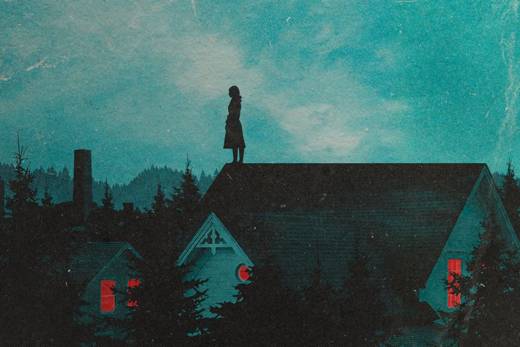Episode 9 basically asked us to forget everything we have so far learned about The Kid. If he started life with a relatively normal childhood and a loving family and went on to be a successful adult, how exactly have 27 years in a cage granted him all of those dark powers we've seen? How did this man end up with the ability to prompt perfectly nice prison guards to go on killing sprees, and hospital patients to set fire to their own beds? And, more importantly, why does he want to do those things? Also, crucially: Why hasn't he aged at all?
Further, where does all this new information leave our original Henry Deaver? Is he the real devil? A lady police officer did suggest as much in episode 8, telling him that chaos and devastation have always followed him. It would also explain why childhood Molly felt propelled by her psychic connection to Henry to kill his father in the original timeline. This twist, however, would contradict everything we know about original Henry so far, not least of which his empathetic work with death row prisoners.
Of course, for most of us, this isn't our first split-timeline rodeo. Eight years after its finale, people are still furious about how many questions Lost left unanswered, not to mention that whole "flash-sideways" (yes, another parallel universe) storyline. The third season of Twin Peaks surprised viewers by providing a truly satisfying close to all of the town's mysteries... only to muddy everything up again in the finale by introducing — you've guessed it! — a parallel universe in which Laura Palmer never even died! (Laura screaming in the street in the show's final moments was all of us.)
The trick to getting parallel universes to work on television seems to be either to have them be darker, more surreal versions of reality (like the Upside Down in Stranger Things, or the Black Lodge in Twin Peaks), have them be a perfectly reasonable extension of a sci-fi universe (see: Sliders, Doctor Who) or to employ them purely for comedy, as animated shows like Futurama and Rick and Morty have done. Comedy-wise, Community proved the potential of alternate-timeline greatness in an episode titled "Remedial Chaos Theory." In it, we saw the gang play out the exact same evening in six slightly different, increasingly entertaining ways. Perhaps if Castle Rock had also split its attention evenly between its differing timelines, the second one would feel less tacked on.
In terms of how Castle Rock is going to end tonight, it's worth noting that Lost creator, JJ Abrams, is an executive producer on the show. Abrams is acutely aware that people didn't like the ending of Lost, so would he really be willing to leave viewers with a bunch of unanswered questions again?
Sadly for Abrams, Castle Rock has made it almost impossible to finish out the series in a satisfying way. There are just too many unanswered questions to handle in one hour. Such as: What did the warden know about the schism? Why did he think The Kid was the devil? Is the voice of God, heard in the woods, really the voice of God? Why did alternate universe Matthew Deaver keep original Henry locked up in his basement? Is the warden's suicide related to Matthew's suicide? What does the schism have to do with all of the misfortune that repeatedly befalls Castle Rock residents? Why is Molly more psychic in one timeline than the other? What will happen to Ruth Deaver, now that she has accidentally killed Alan? What happened to white Henry's fiancé and baby after he disappeared into the schism? Is Ruth Deaver a time-traveler? Why was she so terrified of The Kid if, on some level, she recognized him as her alternate son? What the hell was the point of that side plot about the bed and breakfast owners?
Truthfully, if the show had kept things a little more simple, it would be infinitely easier to leave us with a more satisfying ending. An explanation for The Kid's evil deeds, preferably discovered by Henry Deaver, would be great. So would a detailed explanation about the warden's suicide. Some sort of answer as to why so much tragedy befalls this tiny town in Maine would be magnificent, not just for the show, but for the wider Stephen King universe that has been referenced throughout. An ending in which The Kid is sent back from whence he came would be nice too, especially if a risk is posed that he could come back and wreak havoc in subsequent seasons again.


